Aging in Place Home Care Options
10 Types of Aging in Home Services for Seniors
Related Articles
- The Ultimate Guide to Aging in Place
- Aging in Place Statistics
- The Ultimate Aging in Place Checklist
- The Ultimate List of Aging in Place Home Modifications
- Aging in Place Home Care Options
- The Pros and Cons of Aging in Place
- The Most Common Aging in Place Mistakes and How to Avoid Them
Aging in place is a significant goal that has become a core part of the American dream.
93% of adults 55+ see it as an essential goal. The desire to age from the comfort of home offers a source of comfort, independence, and privacy. However, that dream has its challenges.
Aging brings with it many struggles. We become greater fall risks, our health declines, and we're less capable of doing activities that were easy at a young age. These struggles threaten the dream of aging in place.
Luckily, there's a simple solution: in-home care services
What are In-Home Care Services?
Home care services are a wide range of services provided to seniors from the comfort of their homes. These services vary, but all serve the purpose of assisting them with daily living activities or medical needs. The primary goal is to help seniors maintain their independence and quality of life from the comfort of home for as long as possible.
Nine Benefits of Home Care for Seniors
- Independence and Control: Home care keeps seniors in their homes, allowing for autonomy and control over their daily activities.
- Improved Quality of Life: Home care helps seniors manage daily activities safely and efficiently, allowing them to focus on enjoyable activities and enhancing their well-being.
- Mental and Emotional Well-Being: Familiar surroundings and social interaction through companion care can reduce feelings of loneliness and isolation, which are common challenges seniors face.
- Safety and Security: Home care providers can assist with mobility issues, reducing the risk of falls and accidents. Medication reminders and assistance with medical needs can also ensure seniors stay healthy.
- Reduced Hospitalization Risk: Studies have shown that seniors receiving home care are less likely to be hospitalized than those in nursing homes. Recovery at home can also be faster and more comfortable.
- Peace of Mind for Families: Home care offers peace of mind for families, knowing their loved ones are safe and receiving proper care. It can also alleviate the burden on family caregivers who cannot provide necessary assistance.
- Cost-Effectiveness: Home care is generally more affordable than nursing home care. This can be a significant factor for families considering senior care options.
- Personalized Care: Home care plans can be tailored to seniors' needs and preferences. This level of personalization ensures they receive the most effective and appropriate care.
- Companionship and Socialization: For seniors who may be experiencing loneliness or isolation, home care companions can provide much-needed social interaction and emotional support.
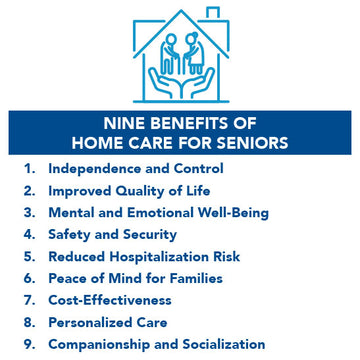
Types of Home Care Services
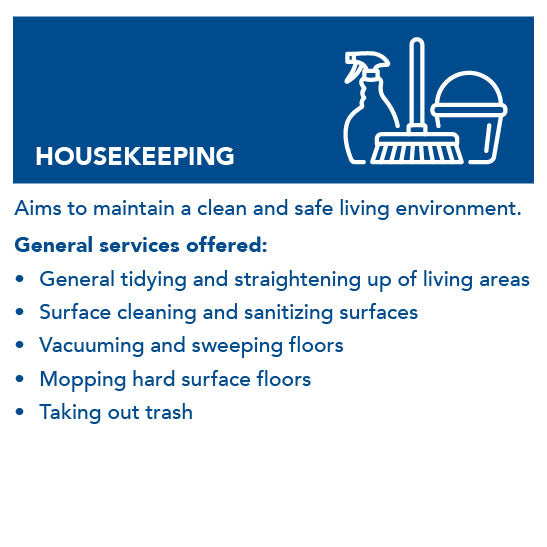
Housekeeping
Housekeeping services typically aim to maintain a clean and safe living environment. They can be a great help as they remove the risk and physical demands of cleaning. General housekeeping services might include:
- General tidying and straightening up of living areas, bedrooms, and bathrooms
- Surface cleaning and sanitizing surfaces
- Vacuuming and sweeping floors
- Mopping hard surface floors
- Taking out trash
Seniors with severe limitations, such as bending over, may benefit significantly from housekeeping services.
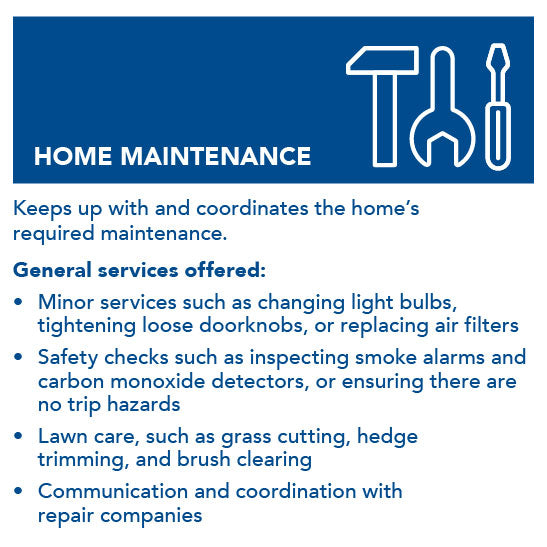
Home Maintenance
One of the drawbacks of aging in place is the upkeep required on homes. Homes need frequent maintenance that can be burdensome and even impossible for seniors. The physical demand alone poses a significant health risk.
Hiring someone to take care of the home's maintenance eliminates that risk.
While services vary depending on the home's needs, they might include:
- Minor services such as changing light bulbs, tightening loose doorknobs, or replacing air filters
- Safety checks such as inspecting smoke alarms and carbon monoxide detectors or ensuring there are no trip hazards
- Lawn care, such as grass cutting, hedge trimming, and brush clearing
- Communication and coordination with repair companies
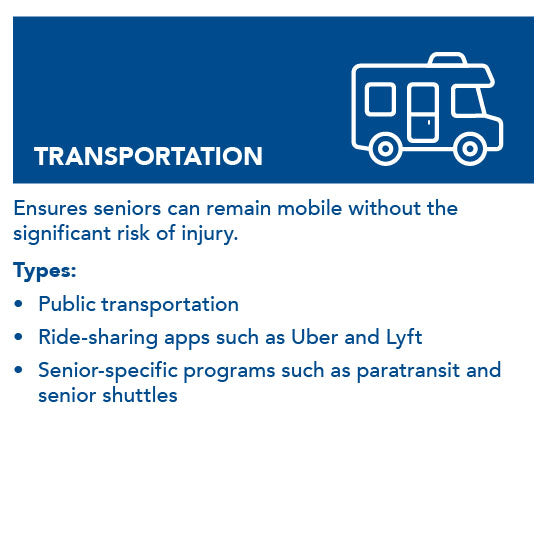
Transportation
With old age comes cognitive and vision impairment. These challenges can make driving difficult and unsafe for seniors.
The CDC has found that people aged 65 and older are involved in more fatal crashes than those aged 35-44. Because of this, it's vital to utilize transportation services. This can include:
- Public transportation
- Ride-sharing apps such as Uber and Lyft
- And senior-specific programs such as paratransit and senior shuttles.
Transportation services can ensure seniors can stay mobile without the significant risk of injury.

Home Modifications
According to the US Census Bureau, only 10% of US homes are aging-ready. This poses a significant threat to the goal of aging in place.
Luckily, there is home help for seniors in the form of home modifications. Certified aging in place specialists will comb your home for safety and accessibility issues. They'll then make modifications to make it safe and accessible. While the modifications will vary, they may include:
- Installing grab bars in the bathroom and throughout the house
- Widening hallways to make space for mobility aids
- Replacing doorknobs with easy-grip lever handles
- Installing shelving to reduce clutter and trip hazards
- And more.
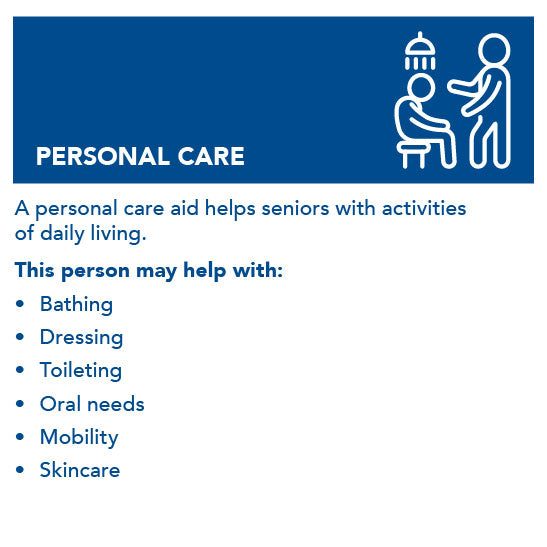
Personal Care
Personal care is an essential component of being healthy. To age in place, seniors must be able to keep up with their activities of daily living. Hiring a personal care aid can be an avenue to age at home. This person may help with:
- Bathing
- Dressing
- Toileting
- Oral needs
- Mobility
- Skincare
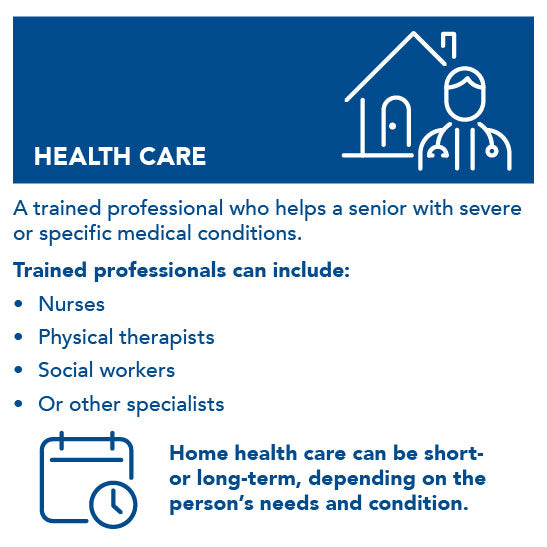
Health Care
Hiring a home health aide may be necessary for those with severe or specific medical conditions. These include trained professionals such as nurses, physical therapists, social workers, occupational therapists, or other specialists.
Home health care can be short or long-term, depending on the person's needs. They may be recovering from surgery or have a condition that requires constant attention.
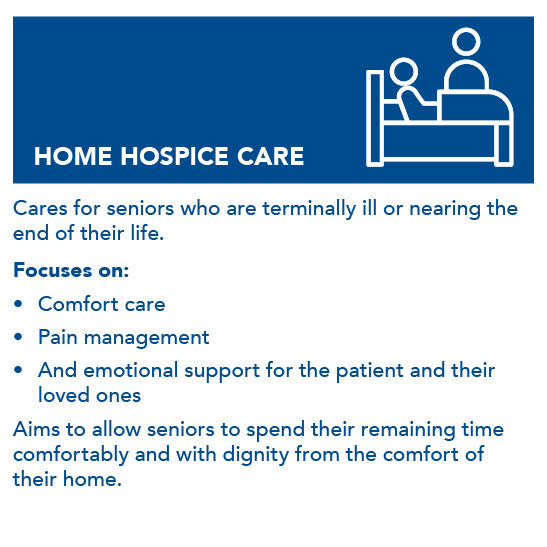
Home Hospice Care
Home hospice care is a senior support service for those who are terminally ill or nearing the end of their life. This senior home care option focuses on the following:
- Comfort care
- Pain management
- And emotional support for the patient and their loved ones.
This care aims to allow seniors to spend their remaining time comfortably and with dignity in the comfort of their homes.
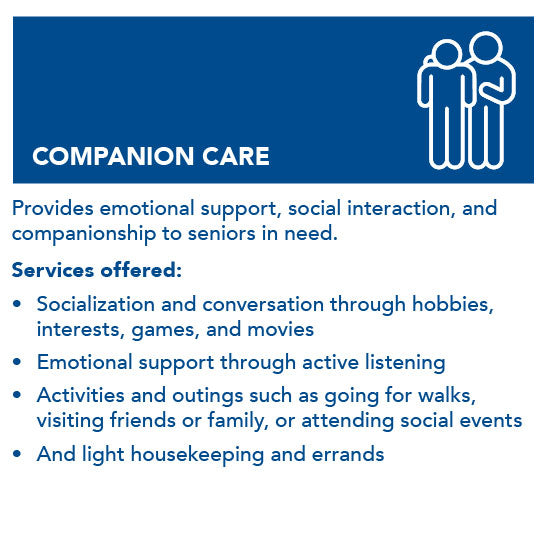
Companion Care
Companion care provides emotional support, social interaction, and companionship for seniors who may feel lonely or isolated. This service focuses on enhancing a person's well-being through social connection and engagement. A few companion care services offered include:
- Socialization and conversation through hobbies, interests, games, and movies
- Emotional support through active listening
- Activities and outings such as going for walks, visiting friends or family, attending social events, or exploring cultural activities
- And light housekeeping and errands such as grocery shopping or picking up prescriptions.
Companion care differs from traditional home care. It focuses on seniors' emotional and mental well-being instead of physical and health needs.
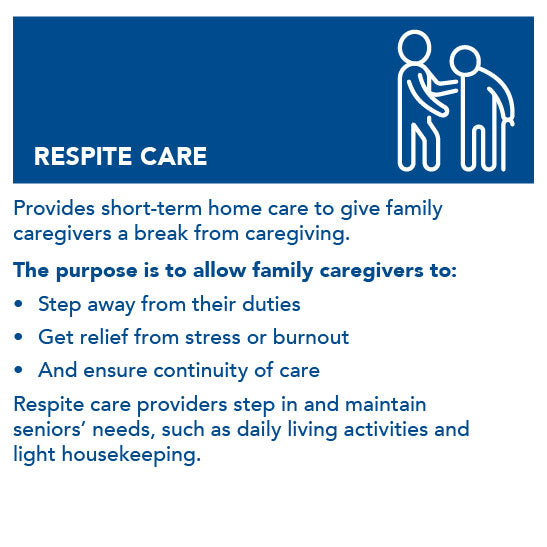
Respite Care
Respite care is a short-term home care that gives family caregivers a break from caregiving duties. The purpose of this type of elderly care service is to allow the caregiver to
- Step away from their duties
- Get relief from stress or burnout
- And ensure continuity of care.
The respite care provider will step in and maintain senior needs such as daily living activities and light housekeeping.
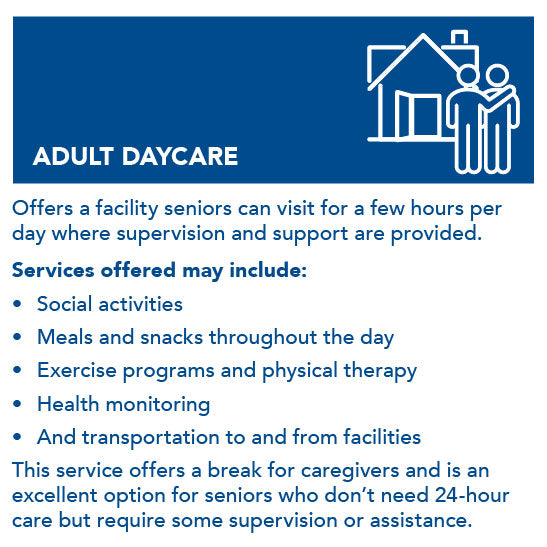
Adult Daycare
Adult daycare provides a safe, structured, and social environment for older adults during the day. Seniors visit an adult daycare facility for a few hours, where staff provide them with supervision and support. This type of care offers a break for caregivers, gives seniors socialization and activity, and supports independence. Services offered may include:
- Social activities such as games, group discussions, and arts & crafts
- Meals and snacks throughout the day
- Exercise programs and physical therapy Health monitoring
- And transportation to and from facilities.
Adult daycare is an excellent option for seniors who don't need 24-hour care but require some supervision or assistance.
How to Choose Home Care
There are many excellent home care options for seniors wanting to age in place. However, the excess amount of services available can be overwhelming. This section explores vital aspects to consider when considering your options for elderly care at home.
Consider Your Needs
You should center your choice in senior care around your mental, emotional, and physical needs. What core areas pose a threat to your independence? Identifying these areas is a great starting point for choosing home care. Here are some key questions to consider:
- Do you need assistance with basic activities like bathing, dressing, grooming, toileting, or mobility? If so, to what extent?
- Do you require medical care services, such as medication management, wound care, or therapy (physical, occupational, or speech)?
- Are there any safety risks in your home, such as tripping hazards or difficulty navigating stairs?
- Do you feel lonely or isolated? Would you benefit from companionship and social interaction?
- Are there any mental or emotional health concerns that home care services might help alleviate?
Look for Referrals from Friends, Family, or Neighbors
Referrals are an excellent way to find home care services. People tend only to recommend services they deem as reliable and reasonable quality.
Establish a Budget Early
While home care services are typically cheaper than assisted living facilities, it's always best to have a budget. There are many types of home care for the elderly, and their prices vary based on the level of care.
Check Insurance Coverage
Some insurance carriers will cover the cost of home care, especially if it's a medical necessity. Once you've identified your needs, check with your insurance carrier to see what's eligible for coverage. This can save you money and time as they may provide a list of eligible care providers.
Check Government Resources
Government resources such as the Area Agencies on Aging, Benefits.gov, and Eldercare locator can greatly help find home care.
Agency vs. Private Care
Studies have found private care providers to be 20-30% cheaper than agencies, making them a more affordable option. However, private care requires you to handle the heavy lifting of taxes, paperwork, and background checks. While private care is cheaper, agencies are more convenient.
Take Your Time, and Don't be Afraid to Say No
Take your time researching and comparing the various types of care for the elderly. This should be a well-thought-out and thoroughly researched decision. It's important to compare services and providers to understand your options. And, above all else, don't be afraid to say no to any provider that doesn't meet your needs.
When Reaching Out
When speaking with a potential home care option, it can be easy to overlook critical details. Because of this, it's essential to come prepared with a list of key objectives and information you'd like to obtain. Here are a few tips when reaching out:
- Check the organization's reviews and ask for referrals.
- Have a list of all your requirements.
- Ask about compensation and payment schedules.
- Do a background check if working with a private care provider.
- Get everything in written form.
- Check the provider has the needed certifications and licenses for the required care.
Frequently Asked Questions
What services do seniors need the most?
While this varies from person to person, a few common services frequently needed include:
- Assistance with daily living activities such as bathing, dressing, grooming, toileting, and mobility
- Meal preparation Light housekeeping such as laundry and vacuuming
- Medication management
- Wound care for those with chronic wounds or post-surgery care needs
- Therapy services
- Fall prevention
- Companionship and social interaction
- And transportation.
Does Social Security pay for home health care?
While social security does not directly pay for home health care, individuals can use the funds to cover expenses.
Does insurance cover in-home care for the elderly?
Insurance may cover in-home care for the elderly, but with varying degrees and limitations. Recognizing the type of care you need and checking with your insurance about what is and isn't covered is vital.
Does Medicaid pay for home care?
Yes, Medicaid can pay for home care services. However, there are some key points to consider:
- Coverage varies by state.
- You'll need to meet your state's income and asset thresholds to qualify for coverage of home care services.
- To be eligible, you'll need a professional assessment. This will determine if you need care that can be safely provided at home instead of a nursing facility.
- Your type of care needed will dictate coverage. Medicaid typically covers many services, such as skilled nursing care, home health aide, and personal care.
To know if you qualify, contact your state Medicaid agency or talk to a Medicaid planning specialist for help.
Conclusion
Aging in place is a vital component of aging for many. It represents a quality of life and independence many yearn to have later in life. The many options for in-home care for the elderly offer an excellent support to keep them active, able, and in their home.
If you or a family member wants to age in place, it's important to choose the right home care service. This will help you stay in your own home as you get older. Making the right choice is crucial for achieving this goal.
Aging in Place Resources
About the Author

Brandon Landgraf is the Digital Marketing Manager for Carex Health Brands. He finds passion and fulfillment in creating content that enhances, improves, and enlivens others' quality of life. All of his written work is formulated to not only offer essential advice and tips but back it with proven studies and experts. His mission is to connect with readers and provide steps to make their lives better.
You can connect with him on LinkedIn here.
About Carex Health Brands
Carex is your one-stop shop for home medical equipment and for products that assist caregivers with providing the best possible support and care for their loved ones. Carex Health Brands has been the branded leader in in-home, self-care medical products for over 35 years. Our goal is to improve the lives of our customers by bring them quality products that bring dignity back to their lives. With our three nationally distributed brands, Carex Health Brands serves national, regional and independent food, drug and mass retailers along with wholesalers, distributors and medical dealers.

